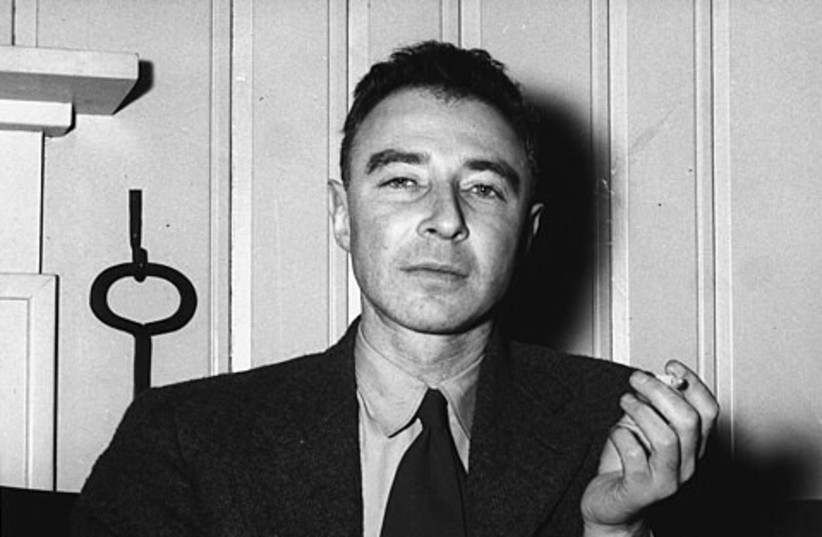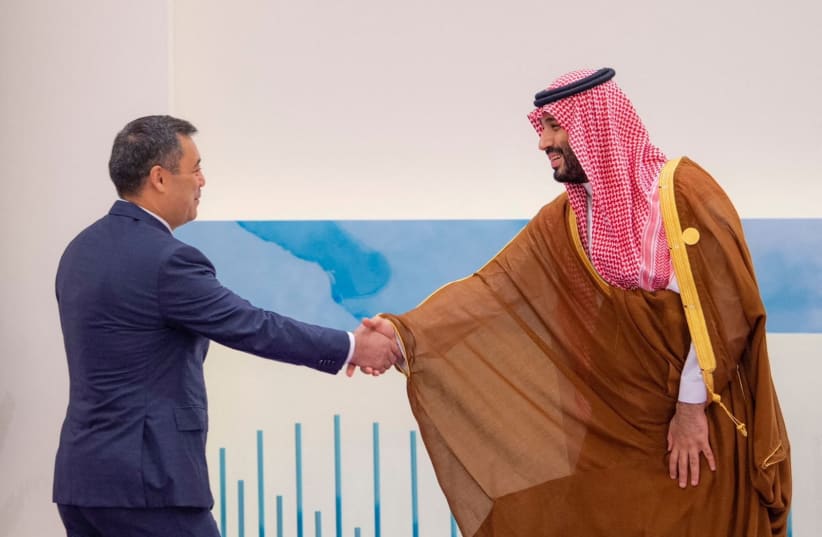Isn’t it time for real peace?
Okaz, Saudi Arabia, August 10
The Arab-Israeli conflict is one of the world’s longest-running and most tragic military standoffs, having brought great pain, death, and destruction to the region. Since the Nakba [“Catastrophe,” term Palestinians use to describe 1948 War of Independence], various political actors have taken power in Israel without fully recognizing that there are other people in the land of Palestine who are entitled to their own peoplehood and homeland. Israel’s logic has been to implement changes on the ground that legitimize its superiority, yet this strategy has failed to create lasting peace and stability for the Jewish state.
Military superiority may temporarily bring truces, but it cannot guarantee true peace. For decades, Israeli governments have been asking how they can garner the greatest gains under an imposed reality where Israel enjoys clear superiority over the Palestinians, who can only depend on the support of their Arab brethren and their own strength to withstand the situation. Perhaps it is time for Israel to reframe the question: How can we live together on this land with the Palestinian people? How can we become an integral and genuine part of the region and its people?
Since the Madrid Conference [in 1991], we have missed out on numerous avenues to establish peace, yet today the prospects seem brighter. This is particularly true for Israel, where many citizens now recognize the looming threats arising from changes to the country’s political system. Numerous regional leaders have the potential, willingness, and capability to construct pathways toward peace. Here, Crown Prince Mohammed bin Salman of the Kingdom of Saudi Arabia deserves particular attention. He carries an expansive project that extends beyond the kingdom, encompassing the realism of economics, politics, and society. His Highness is determined to bring security and stability to the entire Middle East. Already, he has changed the face of the region in a brief period, beginning with the Al-Ula GCC Summit and the most recent Arab League Summit. These efforts led to successful negotiations with Iran, bridge building across the East and West, and the recent development of an international vision to broker a ceasefire in the Russo-Ukrainian war.
Real peace requires consensus from both sides. If the Palestinians have strong leadership that desires peace, and if the Arab leadership is motivated and has an influential personality like Prince Mohammed bin Salman, then this is a great opportunity that may not present itself again. This message is not only directed at Tel Aviv but also Washington: The US has the means and power to contribute meaningfully to the pursuit of a lasting peace between Israelis and Palestinians. – Rami Al-Khalifa Al-Ali
Trump at the center of the upcoming presidential election
Al-Ahram, Egypt, August 9
The start of the 21st century was marked by a tragic event when terrorists attacked the World Trade Center in New York, as well as targets in Washington, including the Pentagon. In response, then-US president George W. Bush declared a “war on terror” in Afghanistan and Iraq, although these attempts at creating an “American century” ultimately failed. When Barack Obama entered office, he pursued an opposite approach of reducing the US’s involvement in global conflict.


This ultimately set the stage for the election of Donald Trump, a vocal proponent of white nationalism. While he eventually lost the election to Joe Biden, his continued presence in American politics has caused a stir. He rejected the election’s results and incited violence from his supporters, leading to a storming of the Capitol in January 2021. The upcoming United States presidential election is certain to be electrifying, with the prosecution of former president Trump at its center.
Trump has denied the 37 charges leveled against him, leading to a schism in the Republican Party between those who stand by the former president and those who don’t. Another area where the division has become evident is between the Democratic Party’s moderates, headed by President Biden, and the more radical Left, headed by “the Squad.” Trump is facing numerous legal battles, including those pertaining to sexual assault, his alleged destabilization of the government, and the possession of confidential presidential documents following his departure from the White House. These sensational trials will prove to be a crucible for the US Constitution itself, as well as for global politics. – Abdel-Moneim Said
Mecca conference on religious moderation
Asharq Al-Awsat, London, August 11
With the generous blessing of the Custodian of the Two Holy Mosques, King Salman bin Abdulaziz, the Saudi Ministry of Islamic Affairs is scheduled to host an Islamic conference in Mecca titled “Communication with the Departments of Religious Affairs, Ifta and Sheikhdoms in the World.” The conference, held on August 13-14, was attended by 150 scholars, as well as 85 muftis, sheikhs, thinkers, and academics who will discuss issues of moderation, extremism, tolerance, and coexistence between peoples. This is, of course, a commendable quest and a noble effort.
But who exactly is representing Islam in its current state? Who is the beacon to all Muslims around the world who rely on its guidance? Muslims are present all over the world, from Muslim-majority nations to the remotest corners of the Christian West. They have become citizens of those countries as well as influential political figures, from Sadiq Khan, the mayor of London, and Sayeeda Warsi, former leader of Britain’s Conservative Party, to parliamentarians, city mayors, and community leaders. Some have even risen to the position of heads of security agencies.
For many years, the call for a moderate culture that embraces the value of tolerance and coexistence has been a matter of imperative urgency, not only in Muslim countries but also far beyond their borders. This is because developing such a discourse and fostering its spread is no longer a concern exclusive to the Islamic faith but a global issue that affects everyone. The consequences of Islamic extremism are felt by all inhabitants of the planet, just like any other kind of extremism. Reaching the goal of forming a thriving Islamic society requires both great courage and political support, as well as persistent effort. The experts in Islamic law must determine if there is an agreed-upon understanding of what Islamic law is. Is it a primordial and undeniable truth? Or is it based on human understanding, such as reason and norm-making?
Ultimately, it is up to the experts to make this determination. As the world grapples with the complexities of modern citizenship, legal responsibility, and belonging, the idea of the “nation” holds an ambiguous role. It is both an emotional vessel that binds a people to a larger civilizational framework and a concept that can have both fleeting and destructive implications. Throughout history, countless scholars have sought to understand and explain these issues. It is our sincere hope that those who attended this conference, seeking goodwill for the citizens of the world, had luck in their discussions and endeavors. – Meshary Al-Dhaidi
‘Oppenheimer’ and the renewed debate on nuclear weapons
Al-Ittihad, UAE, August 11
Two new films, Greta Gerwig’s Barbie and Christopher Nolan’s Oppenheimer, were released worldwide in July, resulting in much-needed revenue for Hollywood studios. Viewers young and old were captivated by these films’ stories, cinematography, and acting, as evidenced by the overwhelming praise they have received. This piece will focus on Nolan’s Oppenheimer – an adaptation of Kai Bird and Martin Sherwin’s award-winning 2005 book.
The film covers three distinct stages of J. Robert Oppenheimer’s life: First, his early roots in California and his time spent in Europe, where he gained notoriety as a prominent theoretical physicist and involved himself in the politics of the American Communist Party. He ardently backed the Republicans in the Spanish Civil War, although he never joined the party himself. Second, his oversight of the Los Alamos laboratory in New Mexico and the assembling of a team of scientists and engineers who built the world’s first nuclear bomb, nicknamed “Trinity,” which was tested on July 16, 1945. Last, the end of Oppenheimer’s professional life in 1954, when his security clearance was revoked amid accusations of his once-communist ties.
His disapproval of the development of the hydrogen bomb, which is 1,000 times more powerful than the two atomic bombs dropped on Japan, also worked against him. A new book by historian and journalist Evan Thomas, titled Road to Surrender, has compellingly established that the American decision to use the atomic bomb without warning on Hiroshima and Nagasaki was the right one given the alternatives at the time. During the spring and summer of 1945, US forces fought intense battles with Japanese forces at sea and on the islands of Iwo Jima and Okinawa. An invasion of mainland Japan was estimated to cost hundreds of thousands of American lives and potentially millions of Japanese lives.
Despite the devastating effects of conventional aerial bombings on Japanese cities, only one member of Japan’s High War Council, Shigenori Togo, was advocating for peace at the time. The atomic bombs were dropped on August 6 and 9. Following this act, Togo eventually managed to persuade Emperor Hirohito to make the decision to surrender on August 15. At the time of the Trinity test, the short- and long-term effects of nuclear radiation were not yet understood. Decades later, it has become known that American citizens living in the Los Alamos region in 1945 went on to develop various forms of illness, most notably cancer.
For more than 70 years, these individuals have sought full acknowledgment of their suffering from the US government. Some have received compensation, yet Washington has still not offered official recognition of the matter. The debate ignited by the Oppenheimer film has raised critical concerns over the use of nuclear weapons, their potential use in current global conflicts, and their acquisition by other nations around the world. – Jeffrey Kemp
Translated by Asaf Zilberfarb
